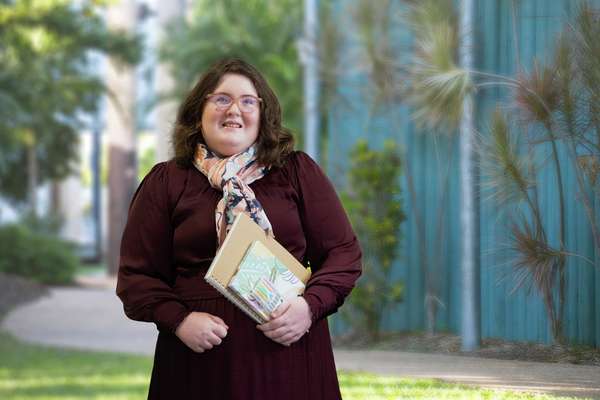
Study the Bachelor of Arts to equip yourself with a multidisciplinary education in a range of humanities and social sciences disciplines. Discover unlimited choices in exploring your passion and interests.
The Bachelor of Arts provides you with a varied and multidisciplinary education and the opportunity to gain knowledge in a range of humanities and social sciences disciplines.
You will experience a variety of perspectives, methodologies, and learning styles, as well as explore disciplines that study how humans recognise, record, and debate human practices, meanings, and values. This will aid you in developing a contemporary understanding of the human condition and how society operates.
By studying CQU's Bachelor of Arts, you'll gain relevant skills and knowledge and have the flexibility to tailor your studies to align with your career goals and personal interests. With a plethora of majors and minors to choose from, you can truly shape your educational journey.
Discover more about your multidisciplinary arts course and the real-world, practical experiences that will complement your new discipline knowledge. Click 'Explore Study Experience' for more information.

I chose the Bachelor of Arts as it was greatly versatile and catered to my love of writing. The best thing was the fact it was so rich in content and stimulated my mind.
Katherine Butler
Bachelor of Arts
The skills and knowledge that you gain within the Bachelor of Arts are transferrable across a wide range of industries and professions. You will gain life-long skills in creative thinking, critical reading, critical thinking, effective writing and communication skills, developing clear and cogent arguments, research, data analysis, understanding intercultural relationships, social justice, cultural heritage and environmental planning. These skills are regarded highly by those who recruit university graduates for government departments and various large companies and are beneficial to roles across a range of businesses and industries.
Explore endless career possibilities such as roles within government agencies, administration, publishing houses, environmental planning and management, media, journalism, libraries, museums, galleries, not-for-profit organisations, private companies, teaching, town councils, disability services, community sector organisations, youth workers and universities.
Upon completion of the Bachelor of Arts, you may also be interested in our:
The course structure and available locations can change depending on when you want to study. You can choose the intake that best suits you in the drop-down menu below.
You must complete 24 units (144 credits):
The units you'll study are listed below. Click on a unit to learn more.
You will study the four units listed below.
The Creative Writing Major consists of the six units listed below. Two units are double weighted, meaning you will complete six units instead of eight for this major.
Do you have a passion for writing? This major allows you to develop the skills and knowledge needed as a writer in the digital age. You will develop a tool kit of writing styles and genres, including traditional fiction, non-fiction, poetry and scriptwriting, and experimental and hybrid genres such as speculative fiction, flash fiction, lyric essays, docufiction, and concrete poetry, among others.
The Digital Storytelling Minor consists of the four units listed below.
This minor introduces you to fundamental skills in visual design, digital video production, and narrative and documentary filmmaking techniques.
To help you plan your studies and see which unit comes first, if one unit should be completed before another and the term you will study each unit, check out our course planners.
This work-integrated learning will involve a placement in an organisation loosely related to one of the BA discipline majors. For example, a work placement in a museum.
Students who choose the Strategic Communication major will have the opportunity to undertake a work placement of 120 hours in a communication related field.
If you have completed prior study relevant to units within this course, you may be eligible for credit for your past studies.
For your application to be considered, you must meet the following entry requirements.
View the student and course profiles for this course and learn about CQU's Undergraduate Profile for Term 1, 2025 via our Institute Profile.
CQU offers a range of alternative entry pathways to help you get started. If you don’t meet the entry requirements, there are options available, depending on your background and previous experience.
While not needed to apply, you'll need to meet the following requirements throughout your studies.
The Indicative First-Year Fee is the approximate cost of enrolling in this course for one full-time academic year (eight units over two terms) for a Commonwealth Supported Place (CSP) and should be used as a guide only. Your actual fees may vary depending on the units you select to study and your study load. Check the Cost per Unit spreadsheet available on our Understanding Course Fees webpage.
Fees are reviewed each year and are subject to change. Fee estimates for the following year are expected to be available in September each year.
This course has Commonwealth Supported Places (CSPs) available, and as a domestic student, you'll be offered a CSP, provided you meet CSP eligibility requirements. CSPs are subsidised by the Australian Government, meaning you are only required to pay the student contribution rather than full tuition fees.
You may be eligible for a HECS-HELP government loan if you are offered a CSP. HECS-HELP is an Australian Government loan scheme that assists you in paying your student contributions. Provided you meet the HECS-HELP eligibility criteria, you may use HECS-HELP to defer part or all of your student contribution fees.
Part of your course costs will include Student Services and Amenities Fees (SSAF). SSAF is charged in addition to your student contribution or tuition fees and is used to help enhance your study experience. There may also be other costs as part of your studies, such as textbooks, technology expenses, travel expenses, professional certifications, uniforms, or vaccinations.
We believe a quality education can be for everyone – regardless of background, location, or life circumstances. That's why we offer a variety of scholarships and bursaries that can give you a helping hand with a range of expenses and enhance your employability.
Check what you need to do to apply to study this course.
Prior to applying, take a look at important application dates and learn about our admission considerations, such as information for domestic students with overseas qualifications, indigenous support, and elite athlete, coach and performer support. You should also check out the adjustment schemes that might be available to you and how to access them. You can also explore our offer information to learn more about what happens after you've submitted an application and how to respond to an offer to study with CQU.
When applying through a tertiary admissions centre (TAC) you can use the relevant TAC code below to search for a course or add it to your application preferences.
CQUniversity Australia is a trading name of Central Queensland University
ABN: 39 181 103 288
RTO Code: 40939
CRICOS: 00219C
TEQSA: PRV12073